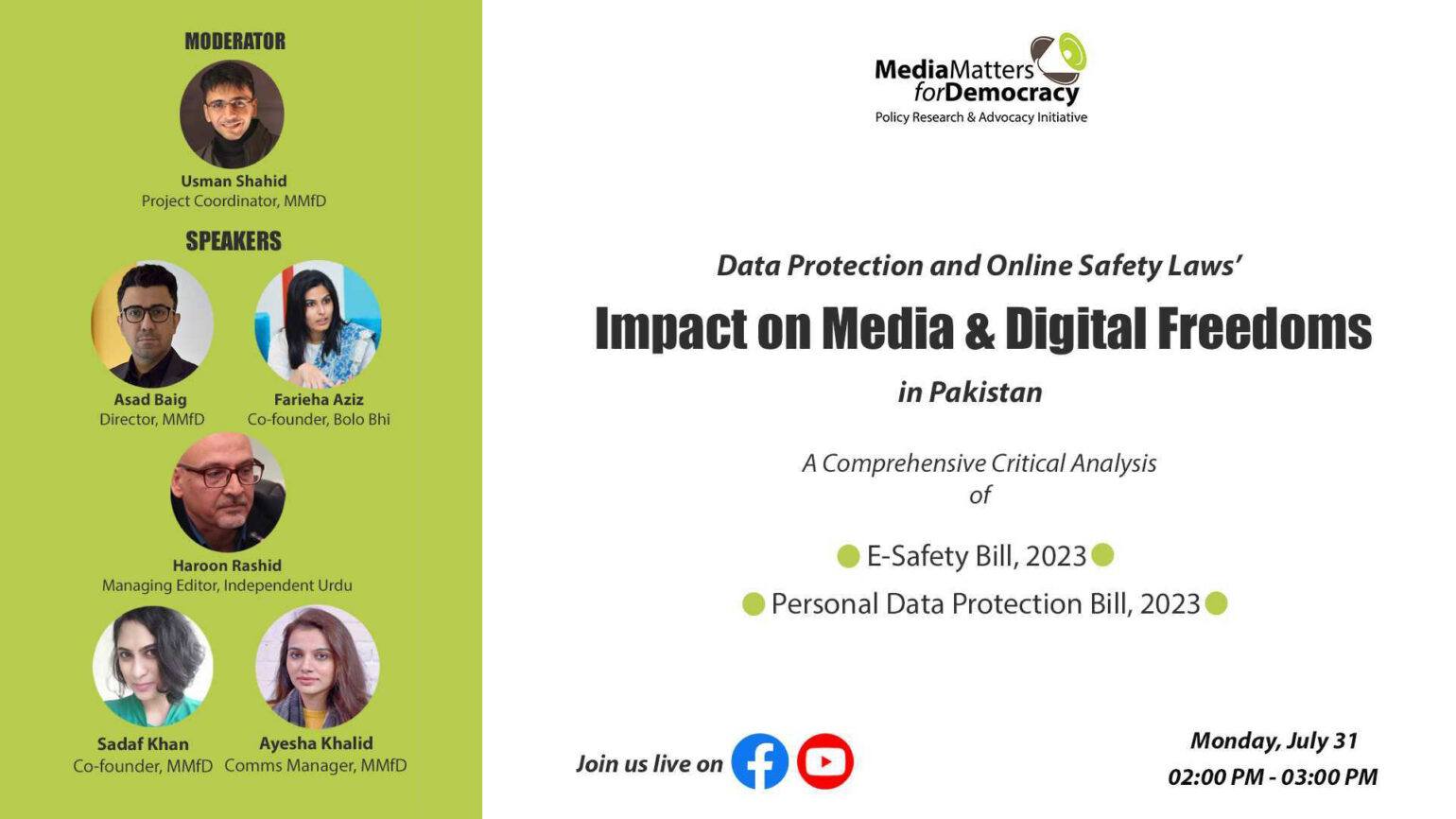Islamabad, Pakistan — Media Matters for Democracy (MMfD) hosted an insightful session, titled ‘Data Protection and Online Safety Laws’ Impact on Media and Digital Freedoms in Pakistan’, on Monday, 31st July, 2023. It critically analysed the wide-ranging implications of the recently approved E-Safety Bill, 2023, and the Personal Data Protection Bill, 2023, on individual rights and digital media in Pakistan.
The panel comprised Farieha Aziz, digital rights advocate and co-founder of the non-profit Bolo Bhi; Asad Baig, media development specialist and director at MMfD; Haroon Rashid, managing editor at The Independent Urdu; Ayesha Khalid, former broadcast journalist leading communications at MMfD; and Sadaf Khan, digital rights and tech accountability expert. The session was moderated by Usman Shahid, project coordinator for the Digital Rights & Internet Governance (DRIG) program at MMfD.
The aim of the session was to examine the proposed data protection and online safety bills and explain to the audiences in simple terms what challenges and threats they entail for tech corporations, digital media outlets, social media consumers, journalists and rights defenders in Pakistan. The bills — granted principle approval by the federal cabinet last week — were met with strong opposition from digital rights advocates, lawyers, journalists, and civil society organisations. Concerns have been raised about these legislative frameworks enabling illegal surveillance and isolating Pakistan from the global digital community.
The panellists raised serious concerns over the surreptitious manner and short space of time within which four media-related bills — E-Safety Bill, Personal Data Protection Bill, PECA (Amendment) Bill, and PEMRA (Amendment) Bill, 2023 — have been drafted and approved by the government. The panellists protested that, contrary to statements made by senior government officials, stakeholders were not onboarded for the claimed “extensive consultations”. They also expressed surprise at the mention of stakeholder consultations taking place at all, ascribing the secretive process to lack of transparency, openness, and inclusion.
According to Aziz, the motive behind the bills is not to facilitate users, but to enable the state to access and use data. She questioned the government’s demand for tech corporations to open local offices, arguing that the prospect necessitates investments worth millions and sound infrastructure.
Khan highlighted the repetitive pattern of oppressive cyber laws being introduced in the country prior to the elections without any transparency. She said there is no access to the drafts (the E-Safety Bill, 2023 has yet to be made public) and it is learnt of these draconian legislative frameworks through various disclosures instead of official representatives and communication channels. According to Khan, the new legislations contain only semantic and linguistic changes but the regressive tactics behind them all remain the same.
Baig remarked that such draconian laws are not new, questioning why activists were not made part of the claimed consultations. Highlighting how the Pakistan Tehreek-e-Insaf (PTI) government had introduced six laws on media regulation when it was in power, Baig expressed concern at the urgency behind the four recent bills approved by the Pakistan Muslim League-N (PML-N) government and the lack of transparency in legislative processes.
Rashid raised the same question and said people had no idea when and where the said consultations were held, or why the stakeholders concerned were not included. He remarked that as a member of the media fraternity, he was completely unaware that there had been consultations regarding the media bills at all. Rashid added the consultative process does not look not authentic and that holding a consultation does not mean engaging only a few people, but onboarding diverse stakeholders so they can be informed how their concerns will be addressed.
Khalid, on the other hand, pointed out the continuing lack of equal representation in policymaking. According to her, when legislations with such myopic and repressive aims are formulated, it is the women and marginalised communities that are affected the most. Citing the insensitive treatment of harassment cases filed by women and individuals from marginalised communities under PECA, Khalid lamented there are no special provisions for the safety of women in online spaces where they can openly exercise their right to free speech and expression. She stressed the need for measures curated specifically for the safeguard of digital rights of women and vulnerable individuals.
Watch the complete session here: https://www.youtube.com/watch?v=0wn7WLKyBF0

